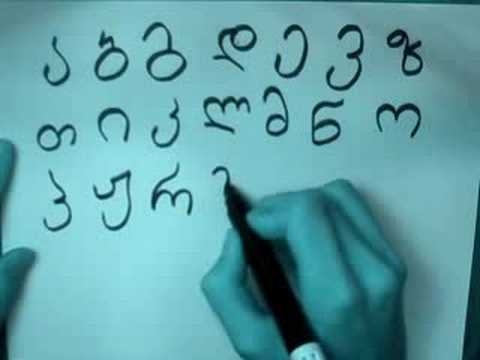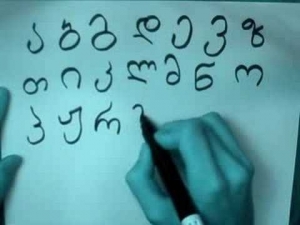The Frog that Croaks in the Water
Bakaki tskalshi kikinebs – ring any bells?
When I think back to my first days in Georgia, as a foreigner and not having much of an idea about the culture, identity or indeed, language of the former soviet republic, it makes me smile. Not simply because they are fond memories, but because the identity of that person eludes me. I don’t really recognise her anymore. This, if memory serves, was back in 2014. Personal ties took me, quite happily so, to the country. I remember it vividly. I instantly fell in love with Tbilisi, coming from London, I had never seen such contrast before. Yet, one prominent memory will always stay with me. Looking out of the window of a cab from Tbilisi airport to Didube, with a jaw-dropping type expression on my face, trying to avidly comprehend how people could actually understand the Georgian alphabet, and pronounce letters that, to my naive ears, sounded incomprehensible. I’m not going to bore you with anything other than my quest to learn the language, for fear of rambling on. Suffice to say, my initial trip took me to three Georgian cities, all in stark contrast to the other. Tbilisi, Batumi and, rather significantly, Zugdidi. I had already brushed up on my Russian before arriving, as I knew that English, at least outside of the capital, was not widely spoken.
Sitting around the table in the Kakhati region of Zugdidi, at a Supra my hosts had put on in honor of my arrival, I vividly remember a dear, dear lady, whom will always stay in my heart, slowly going through the Georgian alphabet and asking me to repeat. Wait right there; let me paint you a little picture, this very evening was the first time I’d ever ‘tasted’ Chacha. I was already two shots down. Megrelian Chacha is stronger than any other, and at this early stage and in my slightly intoxicated state, I pathetically thought I could repeat back what was being said to me. Wrong. My vain efforts were met with uncontrollable laughter. Three letters in particular. If you are not Georgian, and have had some time in this country, no doubt you’ll know what these three letters are.
ყ – Well blow me down, this ain’t a letter, it’s a trick of the tongue, no?! No. It is a letter, and one I thought I would never be able to master
კ– Ok, so a hard ‘K’ right? So why am I being told that I’m pronouncing it incorrectly? It’s what I like to call ‘the click’ – The word Yes (in Georgian: კი) is a prime example of this, and where ‘the click’ is best displayed.
წ– A jumple of letters all rolled into one! ‘Tz’ was a real enemy of mine in the beginning.
So I suppose back then, looking back, I admitted defeat. I gave up trying and stuck to Russian. Then something weird happened..
My life then took me back to London for a while, but I would come back to Georgia every couple of months and drive by the same places. So, to my actual point, what was the triggering factor in my learning of the language? The word ‘Lombardi’. I kid you not. There in an area stretching from the church on Rustaveli, up until the beginning of Vake on Chavchavadze, that has Lombardi’s (Bureau de change) a plenty. So those were my first letters, simply because they were blasted everywhere and I knew what it said. Having 8 letters under my belt, I thought I’d test the waters and see if I could go any further. I went to Biblus books and bought a children’s book on the Georgian alphabet. A….B…..G….three more. Maybe this seemingly impossible language was possible after all, just maybe?
My linguistic skills improved slowly over the next year, with frequent visits to Georgia, me listening to Georgian radio and news in my office in London, and a year to the day that I first visited Georgia, I decided to move there. I got a job as a Medical Director and my daily sentence structure mostly consisted of an English base, with some Russian words thrown in and ending it with ‘Aba ra’ – I didn’t really know what I was saying, but knew I could finish off a sentence this way without sounding too conspicuous. I recently had a conversation with my friend about the meaning of the word ‘Aba’, and how it can be translated into English. To this day, I cannot find one single word to define its numerous connotations in Georgian.
I owe a lot to my job there, and to the people I had around me. I truly believe that if they had have spoken more English, my level of Georgian would not be where it’s at today. As the days, weeks and months rolled by, I found myself conversing more and more in Georgian; sometimes without even realizing it. I am frequently asked by Georgians and foreigners alike, how I learnt the language and more specifically, how I learnt to pronounce the letters. The secret? I have no friggin’ clue. All I can say is I immersed myself in Georgian life. Not an ex-pat one. I had one British friend in Tbilisi, that was it. The rest of my beloved friends were Georgian speakers only. So, the only methodology I can come up with to explain my attainment was that firstly, I had no choice, I chose to really listen and mostly importantly, I TRIED. Sure, I failed on many an occasion, but if I hadn’t given it a go, I’d be no nearer to success.
As I look back on my article here, I realize that, once again, I’ve swayed from point to point. Let me conclude by saying this: I am now somewhere near fluent in Georgian. However, I’m not exceptionally intelligent, don’t have a ridiculously high IQ, nor am I a book worm who studied the language nonstop until perfection, at least in my eyes, was attained. No, I lived it. I breathed it. Most importantly still, I had a true passion for the language, and the country. I still do. I encourage those of you who may have some reservations about giving it a go, to really try. It’s possible. I arrive at Tbilisi airport to the greeting of ‘’You’re the English girl who speaks Georgian, right?’’ – enough of an incentive for me.
By Tamzin Whitewood











